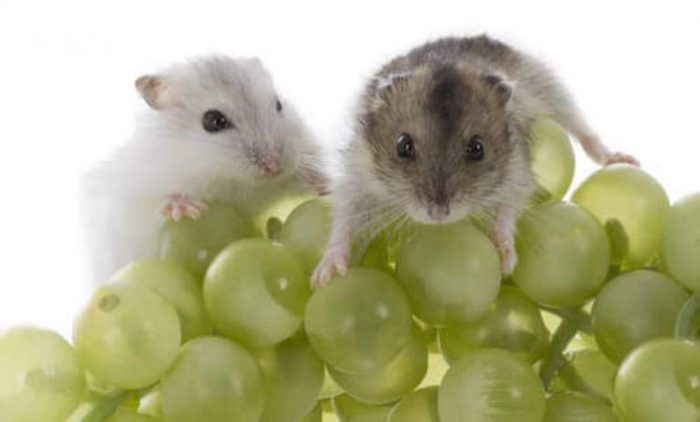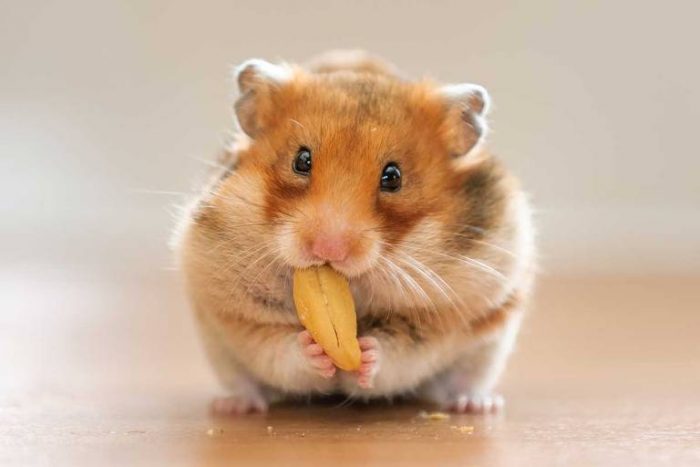Considering the wide range of food options available to hamster owners, feeding this furry rodent is presumed to be relatively simple and very easy. However, pet parents should be aware of the fact that not all types of food go down well with tiny pets. The options to consider include carefully formulated dietary ingredients that will give your furball a well-balanced diet. While shopping for the best hamster foods, remember that there are some items to avoid. These foods can portend harm to your hamster when consumed in large quantities. Learn more as you read.
Table of Contents
Food Items You Can Give A Hamster
As earlier mentioned, feeding a hamster is quite simple; any of the under-listed food items can suffice as hamster food.
Pelleted Hamster Diets
Each bite of a pelleted hamster food provides your pet rodent with a completely balanced diet. Nutrition experts recommend them for the following reasons. Pelleted hamster foods are designed in different shapes but normally resemble tiny cookies, biscuits, or cereal. A hamster that is fed with loose seed mixes is likely to be picky, selecting only its favorites – this results in an unbalanced diet and can be prevented with pelleted hamster food. Besides, pelleted foods are also suffused with supplements.
Seed Hamster Diets
While choosing your loose seed mix diet, be sure to select the one that is replete with a variety of foods like dried vegetables, grains, and seeds. Part of the mix for some loose seed mixed foods can also include a balanced pellet food. Your hamster should always empty its bowl before you pour in fresh serving to avoid picking out only its favorites. The best hamster foods should have all the nutrients the rodent needs to stay healthy.
Fresh Foods And Treats For Hamsters
As we already know some of the foods we eat can serve as the best hamster foods. Though a hamster can be fed with a variety of human foods, the treats should be limited. All junk food should be skipped and you must stick to healthy stuff such as fresh vegetables, whole grains, and fruits (in moderation, diarrhea may occur otherwise).
Here is a list of safe human diets and the best hamster foods you can give your pet rodent.
- Apples (no seeds)
- Bananas
- Blueberries
- Broccoli
- Carrots
- Cauliflower
- Cucumber
- Dandelion greens
- Grapes
- Kale
- Peas
- Potato (cooked)
- Romaine lettuce
- Spinach
- Strawberries
- Sweet potato
- Squash
- Hay
- Whole grain bread or toast
- Whole wheat pasta (cooked)
- Brown rice (cooked)
- Whole-grain cereal (no sugary cereal)
- Mealworms
- Crickets
- Small pieces of cooked chicken
- Hard-boiled eggs
- Nuts (unsalted, no almonds)
- Peanuts (unsalted)
- Pumpkin seeds
- Lentils
- Sunflower seeds
- Plain air-popped popcorn (no butter or salt)
Hamsters love to eat peanut butter but caution must be applied (same with all sticky foods) because it can cause severe problems when it gets stuck in the rodent’s cheek pouches. A thin layer on a piece of wood may suffice as an occasional treat, but caution must be applied.
These Items Are Harmful When Used As Hamster Food
Generally, your best hamster foods shouldn’t consist of anything acidic. Naturally, hamsters tend to avoid orange because of the strong smell. Avoid store-bought treats like honey/seed sticks and yogurt drops because of their high sugar content. Dwarf hamsters are susceptible to diabetes, thus sugar should be avoided in their diets and fruit should be used as treats for the dwarf hammy.
Below are the types of meals that should never serve as hamster food
- Any citrus food like lemon, grapefruit, orange, clementine, etc
- Tomato is acidic as well, even though less than a lemon
- Chocolate and sweet treats can cause diabetes
- Fruit seeds or peels like grapes, apples, strawberries, etc. should be avoided
- Anything that is extra spicy or tasty like garlic, onions, spices, and peppers will cause stomach upset
- Foods that are high in fats like some types of dairy or extra fat meat
- Any part of a rhubarb
- Pits from apricot and almonds can be highly toxic
- Celery and very stringy/fibery foods such as cabbage
- Any food containing added salt or sugar
- Any kind of raw potato or beans
- Unwashed foodstuffs like fruits or veggies
Can You Feed Milk To A Hamster?
Yes, milk can constitute part of the best hamster foods since it is not known to be toxic, but there is a proviso. For one, it is not really a good idea to feed your hammy milk, hamster parents need to understand the serious risks associated with including milk in hamster food.
While goat, cow, and soy milk are not known to be necessarily harmful to a hammy, they can portend risks in the environment of a hamster which should be always dry for your furry to stay healthy.
We all know that milk is wet and can be sticky when it spills, this can cause wet bedding, resulting in a mold that can lead to sickness for the rodent. Besides, milk tends to stale quickly, thus, leaving it out for your hammy is a bad idea. Apart from that, sudden changes in a hamster’s diet can portend danger, leading to issues like diarrhea and dehydration – these can be fatal for your pet hamster.
The Ideal Diet For A Hamster Would Contain…
All in all, the following nutrients should be added to your hamster’s meals if you want the little fur to be healthy and live longer.
Carbohydrate
Including carbohydrates in hamster food is a must as they need it to keep going. However, we should avoid feeding the rodent too many carbs to prevent overweight.
Acceptable sources of carbs that make up the best hamster foods include:
- Cooked rice
- Cooked pasta
- Cereal (sugar-free)
- Milk
- Cooked potatoes
- Barely
- Whole wheat bread
- Oats
- Wheat
- Dog biscuits
- Nutritional yeast tablets
Protein
Hamster food should include items that contain protein; however, you may not need to go to the trouble of providing much as most of the prepackaged mixes contain some protein. Protein intake for hamsters should be as low as 12-15% except with baby hamsters or pregnant ones.
Below is a list of acceptable forms of protein for hamsters:
- Live Mealworms
- Grasshoppers
- Crickets
- Small Bits of Fish
- Small Bits of Chicken
- Hard-Boiled or Scramble Eggs
- Small Bits of Beef
- Cottage Cheese
- Insect Larvae
Water
Hamster food cannot be deemed complete without access to constant fresh water. If you have multiple hamsters, the water supply should be increased.
Salt
Feral hamsters have been observed to be licking rocks and minerals that are known to contain salt – this is needed to help them retain water, as well as stay healthy. Mineral salt and salt stick can be provided for domestic hamsters.
Read Also: What Do Rats Eat: A Guide To Keeping Healthy Pet Rats
Supplements

These come in the form of vitamins and mineral supplements which constitute part of a well-balanced diet in the best hamster foods.
Treats
These can come occasionally as rewards or when owners want to spoil their hamsters. Even if a treat does not add extra nutritional value to your hamster’s food, it might improve their happiness and well-being, leaving you with a very pleasant hamster. Treats to be avoided include the ones with high sugar content like cookies, cakes, or chocolates.
